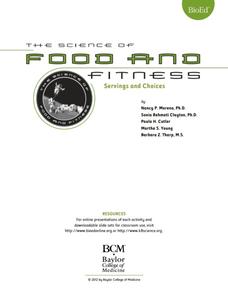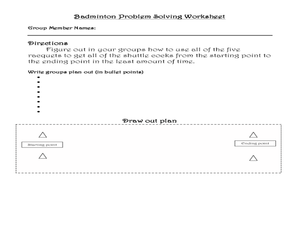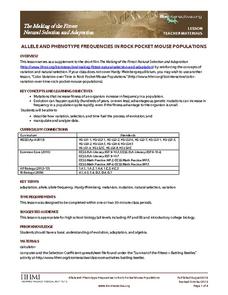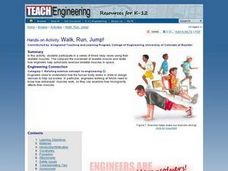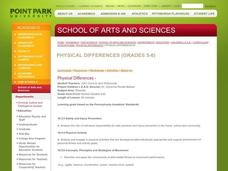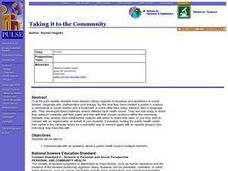Baylor College
Activity and Exercise
Leave it to the classic jump rope to get your class excited about physical activity! Your class will begin by discussing the benefits of jumping rope as a form of exercise and learning a few different types of jumps. Then in groups of...
Baylor College
Your Energy Needs (BMR)
How many Calories one needs on a daily basis is dependent on a number of factors including gender, height, and activity level. In the third of seven lessons about energy and food, young nutritionists calculate the number of Calories...
Baylor College
Energy for Life (Energy from Food)
Energy comes in many forms, but how do living things get the energy they need to survive and thrive? In a simple, controlled experiment with yeast, water, and sugar, groups make observations about how yeast reacts with water alone, then...
Baylor College
Servings and Choices
An important part of balancing caloric intake to energy expenditure is knowing how many Calories you are consuming. In the fifth of a seven-lesson series on food and energy, learners estimate their daily caloric intake, then use a...
Curated OER
Sports and Exercise Activity
Eighth graders practice utilizing motor skills by participating in different sports activities. In this physical education lesson, 8th graders participate in racquetball, shuttle cock, and baseball style activities in order to...
Curated OER
Exercise and Water
Second graders discover the needs of their body by trying different types of aerobic exercise. In this physical education lesson, 2nd graders analyze The Busy Body Book by glancing at the pictures inside and predicting what the...
Baylor College
Energy Sources
Take the concept of burning calories to a more literal level in the second of seven lessons about energy in the realm of food and fitness. Using simple materials, groups will burn breakfast cereal and a pecan to see which one gives off...
BioEd Online
Muscles and Bones in Space
Being an astronaut takes not only high mental acuity, but also a high level of physical fitness, especially for those who spend a long amount of time away from Earth, such as the astronauts serving on the International Space Station....
BioEd Online
Serving Sizes
When it comes to eating a balanced diet, portion control is paramount, but what is the difference between the serving size on the nutrition facts label and a portion as determined by the USDA? In a comprehensive look at portion control,...
Curated OER
Allele and Phenotype Frequencies in Rock Pocket Mouse Populations
In the deserts of Arizona and New Mexico, some tiny creatures show just how quickly natural selection can turn a mutation into an advantageous adaptation. Watch a video about rock pocket mice, who show that one small change can make all...
Curated OER
Food Choices The Pyramid Way
Young scholars develop skills in making nutritionally-sound food choices. Keeping a food diary, they analyze their food intake using the food pyramid as a guide. Students identify and explain the relationship of nutrition to personal...
Curated OER
Natural Selection
Students practice calculating allele and genotype frequencies in the framework of a simple simulation using hard candy, calculators, and a worksheet. This lesson includes a three-page worksheet and an assessment question for conclusion.
Howard Hughes Medical Institute
Color Variation over Time in Rock Pocket Mouse Populations
A species-specific look at natural selection, the resource herein examines how adaptations have helped the population of rock pocket mice survive in a changing landscape. To begin, middle or high schoolers watch a 10.5 minute video,...
Curated OER
Walk, Run, Jump!
Students participate in a series of timed relay races using their skeletal muscles. They compare the movement of skeletal muscle and relate how engineers help astronauts exercise skeletal muscles in space. They list the three types of...
Curated OER
Youth and weightlifting
Students research and develop a weight training program appropriate for an 13-16 year old.
Curated OER
Diversity
Students access prior knowledge of the five senses and relate to students with disabilities. In this people with disabilities lesson, students research and use a Venn diagram to compare and contrast famous people and their...
Curated OER
Developing a Public Health Service Message
High schoolers communicate the biological basis for an aspect of a public health issue in a visual manner. They use the basics of a variety of diseases and epidemics to create their Public Health poster and service message.
Curated OER
Taking it to the Community
Learners communicate with an audience about a public health issue in multiple manners. They share their outreach materials with their peers and their chosen audience within the community.



